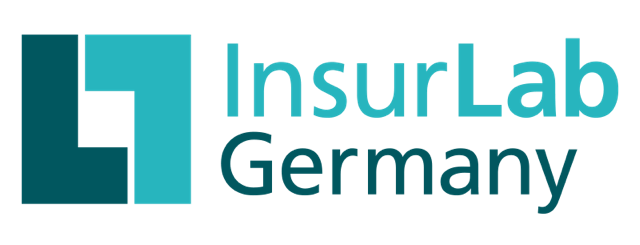After five years with Sebastian Pitzler at the helm, our industry initiative has a new managing director in Anna Kessler since May 1! We took the opportunity to talk to Anna about some topics, trends and challenges in the insurance industry.
Anna, in terms of digital competitiveness, Germany still has room for improvement in the international context. Where does the German insurance industry stand in comparison to other industries and in cross-border competition?
In recent years, the insurance industry has already made clearly recognizable progress with regard to digitization and openness to new topics and approaches. On the one hand, this can be seen in the fact that established insurance companies are increasingly opting for cooperative ventures. with innovative start-ups, as numerous success stories from the InsurLab Germany ecosystem show. On the other hand, some insurers are also experimenting with new approaches and technologies themselves, for example through spin-offs or strategic acquisitions and investments.
with innovative start-ups, as numerous success stories from the InsurLab Germany ecosystem show. On the other hand, some insurers are also experimenting with new approaches and technologies themselves, for example through spin-offs or strategic acquisitions and investments.
In today's fast-moving and highly complex world, it is becoming increasingly important to develop and implement business models, products and services much more customer-oriented and faster. In an international comparison, Germany still has a lot of catching up to do in this area. Unfortunately, this applies to many sectors - both in terms of the technological infrastructure required for this and, in particular, in terms of entrepreneurial thinking and action: We need more courage for change and cross-sectoral cooperation at all levels - from individuals to companies and society as a whole - in order to drive innovation forward.
In your opinion, what role do start-ups play in the digitalization of the insurance industry?
Startups are key drivers and equally stimulators of innovation and transformation. Their focus on state-of-the-art technologies, customer-centric development, high adaptability and pragmatic solution orientation make them an indispensable factor in digitization.
In concrete terms, InsurTechs have two possible roles to play in their positioning. On the one hand, they can position themselves as challengers, independently creating new value propositions for the market and thus challenging the status quo and established companies in the industry. On the other hand, there is the opportunity to work as a strategic cooperation partner with traditional institutions. This model is most common - due to regulatory, investment and customer:internal challenges - especially in the InsurTech sector. Crucial for the success of this model is a trusting cooperation at eye level, with jointly clearly defined goals and milestones as well as open communication along the way.
Where would you place the German InsurTech scene in an international comparison? How competitive is the German InsurTech ecosystem?
Despite a generally positive development, there is still need for action in this country, as our recently published Study shows. We compared Germany with the largest InsurTech markets in Europe - the UK and France - and identified both similarities and differences. For example, most InsurTechs in all countries focus their solutions on the customer interface in the accident and property insurance sector within the framework of direct-to-consumer (D2C) business models.
The differences, on the other hand, already start when looking at the number of InsurTechs that focus on insurance in their core business. While the UK has 224 InsurTechs and France 194, we have only 128 - even though Germany is the largest economy in Europe. Germany also has a lot of catching up to do when it comes to start-up financing - despite the highest cumulative investment volume between 2019 and 2022 - as the majority of these sums are attributable to Wefox. If we were to remove other industry giants such as Clark or Getsafe from the equation, then investment and funding funds for startups in the insurance industry are severely limited and, moreover, even mostly come from foreign capital providers.
So there is a great need for action - for policymakers, for example in the form of the German government's startup strategy, but also for industry initiatives and German capital providers. Only by joining forces to tackle this challenge can Germany be and remain fit for the future, innovative and competitive in the long term.
What successes have already been achieved for and by InsurTechs in this country, and what do you think has fallen by the wayside so far?
In principle, both the Challenger and the cooperation model have been able to produce positive examples in recent years. In the case of the Challenger model, for example, neoinsurers have recently been able to make great strides after initial difficulties in winning customers. On the one hand, this is due to the pandemic and their focus on digitization, and on the other hand, it is due to their proximity to new customer groups or innovative solutions such as Wefox, Neodigital or Ottonova.
In the case of partnership-oriented strategies, there are also numerous successfully implemented use cases and long-term cooperations across the entire value chain. Both in core areas such as product development and sales, underwriting or claims, as well as in support and operational functions.
The main challenge for the cooperation partners remains the holistic thinking through of the customer journey as well as an end-2-end process integration: starting with the end customers via (sales) partners up to the processing. Silo solutions" are often the norm, so that existing potential is not fully exploited. This harbors the risk that successes will not materialize to the expected extent and in the planned time. We are already seeing strong progress in this area in the collaboration between different business units and functions, naturally also aided by new organizational structures such as Agile Transformation. But special attention must continue to be paid to this - as well as to clear prioritization and efficient use of resources.
What role does the sustainability / ESG factor play in the business models of the insurance industry?
In general: A strongly growing role. On the one hand, more and more start-ups are appearing that have firmly anchored ESG and sustainability issues in their business model, such as PlanA or SUMM from our last Accelerator year - or where these criteria are a central element of their own corporate culture and positioning as a responsible employer. On the other hand, the areas of ESG and sustainability are also increasingly coming into focus on the part of corporates. However, as the activities of our members and in our ecosystem show, the general developments are going in the right direction. Gothaer, for example, presented its major sustainability report and an overview of underlying strategic measures at our C-Level fireside evening, while AXA, for example, reported on its already extensive activities in the area of sustainable investment at our Sustainability Topic Day. Furthermore, it can be observed that many companies have introduced centrally or decentrally operating teams that are dedicated to the strategic implementation of sustainability. We therefore sense a great openness here to work on these topics together with partners and start-ups or to promote them.
What challenges will the insurance industry and InsurTechs face in 2023? How can InsurLab Germany support them?
From a thematic perspective, we have identified two central topics - based on our last member survey - which we will address in greater depth, accompanied by the overarching topic of transformation. On the one hand, resource and process efficiency through innovative solutions is an enabler for lower cost ratios and more effective, value-added activities overall. On the other hand, the area of omni-channel / digital sales & embedded insurance offers a wide range of possibilities for gearing insurance products and services more closely and digitally to the wishes and needs of customers.
As InsurLab Germany, we have developed a variety of offerings to sustainably develop the industry and provide targeted support for startups. Our proven accelerator program, for example, focuses on initiating new collaborations. We also offer proactive scouting and match-making, in which we support our members in a very targeted manner and according to their individual needs in finding suitable solution providers. We also connected InsurTechs with partner VCs as well as national and international partners from our network to help them with financing, scaling and expansion. Last, but not least, we of course have many other offerings: Topic Groups for Expert:inenn exchange, insureNXT as a big stage for innovation in the insurance industry, the Academy as a continuing education format for the industry, own and partner events - there is definitely something for all needs.
Together with our members and our ecosystem, we as an industry initiative want to make a significant contribution to the transformation and innovative capacity of the insurance industry. We clearly see ourselves as a think tank and active co-creator of this change!
About Anna Kessler
Anna Kessler has been working at InsurLab Germany in various roles since the summer of 2020. Starting as Senior Start-up Manager, she took over as Ecosystem & Program Director in January 2022, responsible for the further development of the ecosystem and member and partner network. On May 1, 2023, she succeeded Sebastian Pitzler on the management board of the industry initiative. Before joining InsurLab Germany, Kessler worked at Deutsche Bank for around nine years. There, she played a key role in strategic projects and business development initiatives, including the establishment of Deutsche Bank VersicherungsManager. Anna Kessler holds a Master in Law and Business (MLB) from Bucerius Law School / Otto Beisheim School of Management (WHU) and graduated in the top ten percent of her class.
partner network. On May 1, 2023, she succeeded Sebastian Pitzler on the management board of the industry initiative. Before joining InsurLab Germany, Kessler worked at Deutsche Bank for around nine years. There, she played a key role in strategic projects and business development initiatives, including the establishment of Deutsche Bank VersicherungsManager. Anna Kessler holds a Master in Law and Business (MLB) from Bucerius Law School / Otto Beisheim School of Management (WHU) and graduated in the top ten percent of her class.
In addition to professional stations in Rotterdam, Hamburg and Frankfurt, Anna Kessler also travels a lot in her private life: She has now visited over 55 countries and is always exploring new corners of the globe. Anyone who wants to compete with the former track and field athlete can do so by cycling, tennis or skiing.


